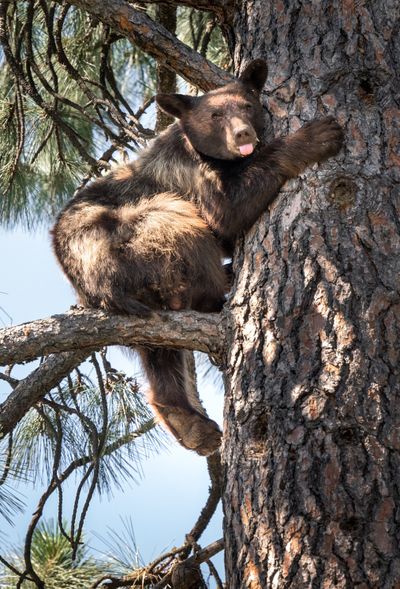In tied vote, Washington commissioners suspend controversial spring bear hunt

A controversial spring bear hunt in Washington was suspended Friday.
The Washington Department of Fish and Wildlife commission voted 4-4 on the proposed 2022 spring bear hunt. The nine-person commission is appointed by the governor to oversee WDFW. Since January, however, one of the commission’s three Eastern Washington seats has been vacant.
Commissioner Larry Carpenter cast the final “no” vote.
Due to the tie, the hunt will be put on hold. Carpenter said he wanted to “confirm the accuracy of our information” before moving ahead with a hunt.
Commissioners Barbara Baker, Fred Koontz and Lorna Smith also voted no.
Commissioners Kim Thorburn, Molly Linville, Jim Anderson and Don McIsaac voted yes.
Commissioners who voted against the hunt questioned WDFW’s population data, which relies on hunter-harvest reports, and argued that the hunt is not supported by the majority of the public.
Commissioners who voted for the hunt defended the accuracy of the agency’s data. Thorburn, from Spokane, pointed out that part of the agency’s mandate is to provide hunting opportunity when ecologically appropriate.
“I feel like we’re violating our mandate and I question the ethics of that by not holding a season,” Thorburn said in an interview.
Following comments from the commissioners, some of which were critical of staff’s data, WDFW Director Kelly Susewind defended the agency’s science and said he heard a number of false or misleading statements from commissioners.
“You’ve heard loud and clear from staff, repeatedly, our professional managers, that these hunts do not impair or cause a concern to the bear population,” he said.
“If you don’t agree with it, and you think it’s too much, you vote no and we move on to our next noncontroversial issue, steelhead,” he said, jokingly referencing the commission’s next agenda item.
WDFW staff had recommended the commission approve the permit-only hunt, which has occurred in one form or another since 1999. The spring hunt is used to address timber damage, human-bear conflicts and concerns about fawn deer and elk survival, according to agency biologists. In the spring, black bears will eat just about anything, including fawns too young to flee. Per the proposed rule for the 2022 spring season, WDFW would have provided roughly 664 spring bear permits, with agency staff estimating hunters would have killed 145 black bears.
It’s a popular hunt, with nearly a dozen hunters applying for each available permit, Thorburn said.
Stephanie Simek, WDFW’s carnivore section manager, said in an interview in October that Washington’s bear population is healthy and urged the commission to approve the hunt. She reiterated those points during Friday’s meeting.
The season, however, has drawn widespread criticism from groups and individuals arguing it’s unethical to target black bears when they are weaker and recently emerged from hibernation. Opponents also questioned the agency’s population surveying methods and raised concerns about orphaning cubs.
The hunt received national attention when the Humane Society of the United States urged its members and supporters to oppose the continuation of the spring bear hunt, noting the concerns about orphaned cubs and calling the hunt “exceptionally cruel.”
Simek said there have been several studies showing that hunting causes less than 2% of annual cub mortality. She defended the agency’s population estimates saying, “I’m confident our assessment is accurate.”
It’s not illegal to kill a female bear with cubs in Washington.
During an October agency meeting on the topic, 50 people gave public testimony against the proposal while only two supported it. According to a staff presentation during Friday’s vote, WDFW received more than 5,000 comments on the proposed season.
“We are disappointed the commission ignored the science that was presented,” said Marie Neumiller, the executive director of the Inland Northwest Wildlife Council in Spokane, adding, “I feel like the decision today aligned with what public comment occurred, but it doesn’t align with the science.”
Neumiller also criticized the fact that Gov. Jay Inslee has not appointed a ninth commissioner, despite requests to do so from her organization and others.
“Had we had nine, we wouldn’t have had a tied vote,” Neumiller said. “We would have had a definitive answer, one way or another.”
Washington was one of eight Western states that had a spring black bear season.
Groups that opposed the hunt celebrated the news .
“This vote is a huge win for Washington’s black bears and all our wildlife and ecosystems,” said Sophia Ressler, a staff attorney at the Center for Biological Diversity in a statement.
“Pausing this hunt to properly analyze the risks will allow for reasoned decision making, and I hope the commission listens to the majority of folks in the state who want these cruel spring hunts to finally come to an end.”